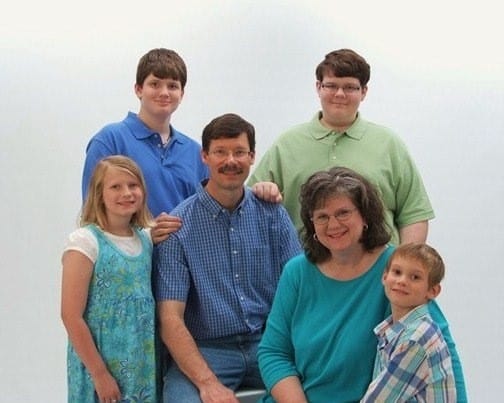Family Finds Cutting-Edge HHT Treatment at UAMS

Emalyn Daniell with her parents, Emma and Forrest Daniell, and her brothers.
| As an ordinary 11-year-old girl, Emalyn Daniel had two questions for her doctor: “Will it hurt?” And, “When can I go swimming?”
Emalyn’s medical condition, hereditary hemorrhagic telangiectasia (HHT), is anything but ordinary. So her parents, Emma and Forrest Daniell, had many questions to ask UAMS interventional radiologist Mollie Meek, M.D.
In her father’s family, one child bled to death inexplicably and another child was disabled after suffering a brain hemorrhage. Emalyn’s parents began seeking answers to their family’s medical mystery and subsequently learned that Emalyn, her father and her three brothers all have HHT. “Patients with HHT often report a family history of sudden, unexplained deaths of family members who appear to be healthy,” said Dr. Meek.
HHT is a genetic disorder that causes abnormalities of the blood vessels in the body. If these problematic blood vessels rupture, severe bleeding occurs.
HHT patients may have ruptured blood vessels in vital organs, causing internal bleeding in the brain, stomach, liver, intestines and in the nose.
Symptoms of HHT vary greatly, even within a family, but can include nosebleeds, strokes, gastrointestinal bleeding and pink spots, especially on the fingertips and around the lips.
Emalyn also experienced headaches frequently. “The severity of Emalyn’s headaches caused her to lose hours out of the day, sometimes several days a week,” her mother said.
Emalyn and her family traveled from the Mobile, Alabama, area to be treated by a team of specialists at UAMS, which is one of the few HHT Centers of Excellence in the country. At academic medical centers like UAMS, the HHT medical team includes a number of caring and compassionate specialists who can perform procedures that are minimally or noninvasive, allowing patients the opportunity to control this condition and lead a relatively normal life.
Medical testing indicated that Emalyn needed to have treatment to reduce an abnormal collection of blood vessels (AVMs or arteriovenous malformations) in her lung. “When you have a pulmonary AVM, some of the blood bypasses the lung, where it would normally be filtered,” Dr. Meek said. “The unfiltered blood carries little tiny pieces of debris and bacteria to the brain and other parts of the body, which can cause strokes or abscesses.”

Emalyn Daniell at Pinnacle Mountain State Park the day after her surgical procedure.
Dr. Meek treated Emalyn using a minimally invasive procedure to plug three pulmonary AVMs. The treatment is called embolization, and it is performed using a tiny tube, or catheter, that is guided through blood vessels from an entry point in the upper leg. Once at the AVM, a small plug is used to block the misdirected blood flow. Before the procedure, “Dr. Mollie” was able to reassure Emalyn that while there might be some minor discomfort, Emalyn would be back to her regular activities within a day or two.
“You can have an AVM in your brain or lungs and not necessarily have symptoms, so we advocate genetic screening for all families with HHT to prevent tragedies,” said Dr. Meek. Patients who test negative for HHT will benefit by not being exposed to unnecessary tests and procedures and won’t pay for treatments that are not needed. “Many patients are hesitant to have genetic testing due to fear of discrimination. But, many laws have been enacted in recent years that make it illegal to discriminate based on medical conditions.”
Emalyn, her father and her brothers will need ongoing screening to detect and treat blood clots in organs before damage occurs. Emalyn’s UAMS medical team is also monitoring an AVM in her brain.
Happily swimming with her brothers at the hotel pool the day after the procedure, Emalyn’s parents are relieved to see her return to the activities that other children regularly enjoy. “She has bounced right back and no longer has headaches. It’s such a relief for us to have great medical care now and to know that our future needs will be met too. We think the world of Dr. Mollie and UAMS.
